- Clone
- D7 (See other available formats)
- Regulatory Status
- RUO
- Other Names
- Sca-1
- Isotype
- Rat IgG2a, κ
- Ave. Rating
- Submit a Review
- Product Citations
- publications
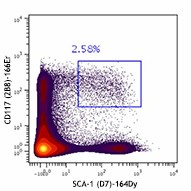
-

Mouse bone marrow cells stained with 164Dy anti-Sca-1 (D7) and 166Er anti-CD117 (2B8). Viable lineage- cells are displayed in the analysis. Lin-Sca-1+c-Kit+ LSK cells are indicated in the gate. Data provided by DVS Sciences.
Ly-6A/E, also known as Sca-1, is an 18 kD member of the Ly-6 multigene family. Ly6A/E is a glycosylphosphatidylinositol (GPI)-linked protein expressed on hematopoietic stem cells. In mice expressing the Ly-6.2 haplotype (e.g., AKR, C57BL, C57BR, DBA/2, SJL, SWR, and 129), Ly-6A/E is also expressed on peripheral B lymphocytes and thymic and peripheral T lymphocytes. Strains expressing the Ly-6.1 haplotype (e.g., BALB/c, CBA, C3H/He, DBA/1, and NZB) have low Ly-6A/E expression on resting peripheral lymphocytes. The expression of Ly-6A/E on lymphocytes is upregulated upon activation from both Ly6.1 and Ly6.2 haplotype mice. Ly-6A/E is thought to be involved in the regulation of both T and B cell responses.
Product DetailsProduct Details
- Verified Reactivity
- Mouse
- Antibody Type
- Monoclonal
- Host Species
- Rat
- Immunogen
- IL-2-dependent mouse T-cell line (CTL-L)
- Formulation
- Phosphate-buffered solution, pH 7.2, containing 0.09% sodium azide and EDTA.
- Preparation
- The antibody was purified by affinity chromatography.
- Concentration
- 1.0 mg/ml
- Storage & Handling
- The antibody solution should be stored undiluted between 2°C and 8°C.
- Application
-
FC - Quality tested
CyTOF® - Verified - Recommended Usage
-
This product is suitable for use with the Maxpar® Metal Labeling Kits. For metal labeling using Maxpar® Ready antibodies, proceed directly to the step to Partially Reduce the Antibody by adding 100 µl of Maxpar® Ready antibody to 100 µl of 4 mM TCEP-R in a 50 kDa filter and continue with the protocol. Always refer to the latest version of Maxpar® User Guide when conjugating Maxpar® Ready antibodies.
- Application Notes
-
The D7 antibody has been reported to induce T cell activation and inhibit TCR-induced IL-2 production. Additional reported applications (for the relevant formats) include: Western blotting1,2, immunoprecipitation1, in vitro lymphocyte activation3-6, induction of redirected lysis7, induction of T cell inhibitory signalling8, immunofluorescence9, and immunohistochemical staining of acetone-fixed frozen sections13 and Bouin-fixed, paraffin-embedded samples9.
The two Sca-1 recognizing clones D7 and E13-161.7 have been shown to bind distinct epitopes due to the inability of D7 to block the binding of E13-161.7.14 - Additional Product Notes
-
Maxpar® is a registered trademark of Standard BioTools Inc.
-
Application References
(PubMed link indicates BioLegend citation) -
- Ortega G, et al. 1986. J. Immunol. 137:3240. (WB, IP)
- Palfree RGE, et al. 1986. Immunogenetics 23:197. (WB)
- Codias EK, et al. 1990. J. Immunol. 144:2197.
- Malek TR, et al. 1986. J. Exp. Med. 164:709.
- Codias EK, et al. 1990. J. Immunol. 145:1407.
- Ivanov V, et al. 1994. J. Immunol. 153:2394.
- Karlhofer FM, et al. 1991. J. Immunol. 146:3662.
- Fleming T, et al. 1994. J. Immunol. 153:1955.
- van Bragt MPA, et al. 2005. Biol. Reprod. 73:634. (IF, IHC)
- Umland O, et al. 2007. J. Immunol. 178:4147.
- Cridland SO, et al. 2009. Blood Cell. Mol. Dis. 45:149. (FC) PubMed
- Pronk CJ, et al. 2011. J. Exp Med. PubMed
- English A, et al. 2000. J. Immunol. 165:3763. (IHC)
- Bamezai A and Rock KL. 1995. Proc. Natl. Acad. Sci. USA 92:4294.
- Wiesner DL, et al. 2015. PLoS Pathog. 11:1004701. PubMed
- Product Citations
-
- RRID
-
AB_2563782 (BioLegend Cat. No. 108135)
Antigen Details
- Structure
- Ly-6 multigene family, 18 kD
- Distribution
-
Hematopoietic stem cells, activated T cells and B cells, subset of resting B cells and T cells
- Function
- Regulates B and T cell responses
- Cell Type
- B cells, Hematopoietic stem and progenitors, Mesenchymal Stem Cells, T cells
- Biology Area
- Immunology, Stem Cells
- Antigen References
-
1. Rock KL, et al. 1989. Immunol. Rev. 111:195.
2. Morrison SJ, et al. 1994. Immunity 1:661.
3. Spangrude GJ, et al. 1988. J. Immunol. 141:3697.
4. Malek T, et al. 1986. J. Exp. Med. 164:709. - Gene ID
- 110454 View all products for this Gene ID
- UniProt
- View information about Ly-6A/E on UniProt.org
Related Pages & Pathways
Pages
Related FAQs
- Can I obtain CyTOF data related to your Maxpar® Ready antibody clones?
-
We do not test our antibodies by mass cytometry or on a CyTOF machine in-house. The data displayed on our website is provided by Fluidigm®. Please contact Fluidigm® directly for additional data and further details.
- Can I use Maxpar® Ready format clones for flow cytometry staining?
-
We have not tested the Maxpar® Ready antibodies formulated in solution containing EDTA for flow cytometry staining. While it is likely that this will work in majority of the situations, it is best to use the non-EDTA formulated version of the same clone for flow cytometry testing. The presence of EDTA in some situations might negatively affect staining.
- I am having difficulty observing a signal after conjugating a metal tag to your Maxpar® antibody. Please help troubleshoot.
-
We only supply the antibody and not test that in house. Please contact Fluidigm® directly for troubleshooting advice: http://techsupport.fluidigm.com/
- Is there a difference between buffer formulations related to Maxpar® Ready and purified format antibodies?
-
The Maxpar® Ready format antibody clones are formulated in Phosphate-buffered solution, pH 7.2, containing 0.09% sodium azide and EDTA. The regular purified format clones are formulated in solution that does not contain any EDTA. Both formulations are however without any extra carrier proteins.
Other Formats
View All Ly-6A/E Reagents Request Custom ConjugationCustomers Also Purchased
Compare Data Across All Formats
This data display is provided for general comparisons between formats.
Your actual data may vary due to variations in samples, target cells, instruments and their settings, staining conditions, and other factors.
If you need assistance with selecting the best format contact our expert technical support team.
-
APC anti-mouse Ly-6A/E (Sca-1)
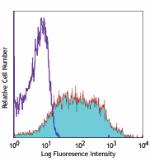
C57BL/6 mouse splenocytes stained with D7 APC -
Biotin anti-mouse Ly-6A/E (Sca-1)
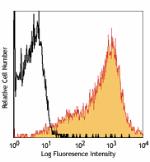
C57BL/6 splenocytes stained with biotinylated D7, followed b... -
FITC anti-mouse Ly-6A/E (Sca-1)
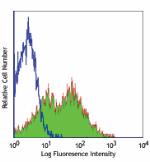
C57BL/6 mouse splenocytes stained with D7 FITC -
PE anti-mouse Ly-6A/E (Sca-1)
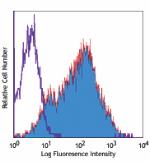
C57BL/6 mouse splenocytes stained with D7 PE -
PE/Cyanine5 anti-mouse Ly-6A/E (Sca-1)
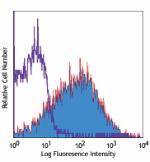
C57BL/6 mouse splenocytes stained with D7 PE/Cyanine5 -
Purified anti-mouse Ly-6A/E (Sca-1)
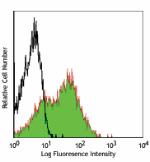
C57BL/6 splenocytes stained with purified D7, followed by an... -
PE/Cyanine7 anti-mouse Ly-6A/E (Sca-1)
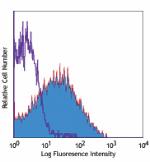
C57BL/6 mouse splenocytes stained with D7 PE/Cyanine7 -
Alexa Fluor® 488 anti-mouse Ly-6A/E (Sca-1)
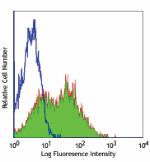
C57BL/6 mouse splenocytes stained with D7 Alexa Fluor® 488 -
Alexa Fluor® 647 anti-mouse Ly-6A/E (Sca-1)
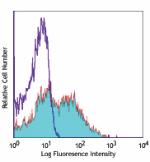
C57BL/6 mouse splenocyteS stained with D7 Alexa Fluor® 647 -
Pacific Blue™ anti-mouse Ly-6A/E (Sca-1)
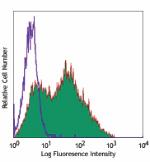
C57BL/6 mouse splenocytes stained with Pacific Blue™ D... -
Brilliant Violet 421™ anti-mouse Ly-6A/E (Sca-1)
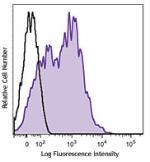
C57BL/6 mouse splenocytes were stained with Ly-6A/E (clone D... 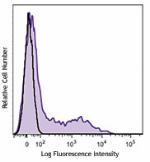
C57BL/6 mouse bone marrow cells were stained with Ly-6A/E (c... -
PerCP anti-mouse Ly-6A/E (Sca-1)
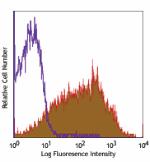
C57BL/6 mouse splenocytes stained with D7 PerCP -
PerCP/Cyanine5.5 anti-mouse Ly-6A/E (Sca-1)

C57BL/6 mouse bone marrow stained with Lineage FITC, CD117 (... -
APC/Cyanine7 anti-mouse Ly-6A/E (Sca-1)
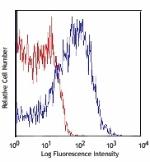
C57BL/6 splenocytes stained with D7 APC/Cyanine7 -
Brilliant Violet 510™ anti-mouse Ly-6A/E (Sca-1)
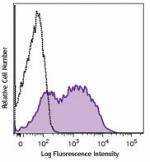
C57BL/6 mouse splenocytes were stained with Ly-6A/E (clone D... 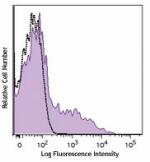
C57BL/6 mouse bone marrow cells were stained with Ly-6A/E (c... -
Brilliant Violet 711™ anti-mouse Ly-6A/E (Sca-1)
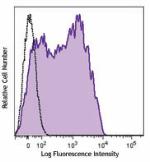
C57BL/6 mouse splenocytes were stained with Ly-6A/E (clone D... -
Brilliant Violet 605™ anti-mouse Ly-6A/E (Sca-1)
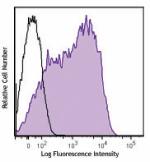
C57BL/6 mouse splenocytes were stained with Ly-6A/E (clone D... -
Purified anti-mouse Ly-6A/E (Sca-1) (Maxpar® Ready)
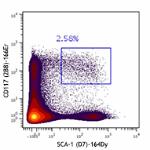
Mouse bone marrow cells stained with 164Dy anti-Sca-1 (D7) a... -
PE/Dazzle™ 594 anti-mouse Ly-6A/E (Sca-1)
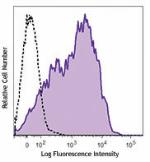
C57BL/6 mouse splenocytes were stained with Ly-6A/E (clone D... -
Brilliant Violet 785™ anti-mouse Ly-6A/E (Sca-1)
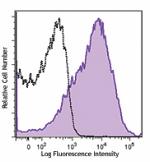
C57BL/6 mouse splenocytes were stained with Ly-6A/E (clone D... 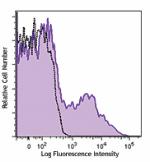
C57BL/6 mouse bone marrow cells were stained with Ly-6A/E (c... -
Alexa Fluor® 700 anti-mouse Ly-6A/E (Sca-1)
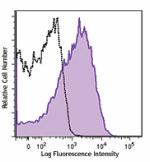
C57BL/6 mouse splenocytes were stained with Ly-6A/E (clone D... 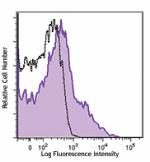
C57BL/6 mouse bone marrow cells were stained with Ly-6A/E (c... -
Brilliant Violet 650™ anti-mouse Ly-6A/E (Sca-1)
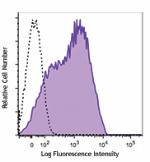
C57BL/6 mouse splenocytes were stained with Ly-6A/E (clone D... -
APC/Fire™ 750 anti-mouse Ly-6A/E (Sca-1)
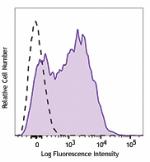
C57BL/6 mouse splenocytes were stained with Ly-6A/E (clone D... -
TotalSeq™-A0130 anti-mouse Ly-6A/E (Sca-1)
-
TotalSeq™-B0130 anti-mouse Ly-6A/E (Sca-1)
-
TotalSeq™-C0130 anti-mouse Ly-6A/E (Sca-1)
-
Spark NIR™ 685 anti-mouse Ly-6A/E (Sca-1)
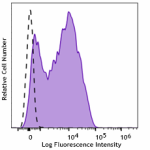
C57BL/6 mouse splenocytes were stained with anti-mouse Ly-6A... -
Spark PLUS UV395™ anti-mouse Ly-6A/E (Sca-1)

C57BL/6 mouse splenocytes were stained with anti-mouse Ly-6A... -
PerCP/Fire™ 806 anti-mouse Ly-6A/E (Sca-1) Antibody

C57BL/6 mouse bone marrow cells were stained with anti-mouse... -
Brilliant Violet 750™ anti-mouse Ly-6A/E (Sca-1)

C57BL/6 mouse splenocytes were stained with anti-mouse Ly-6A...









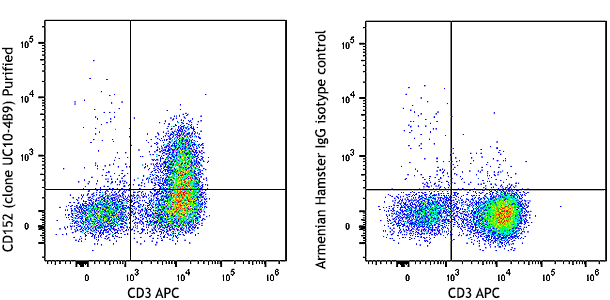
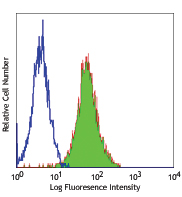
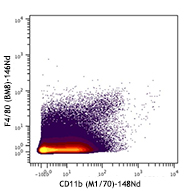
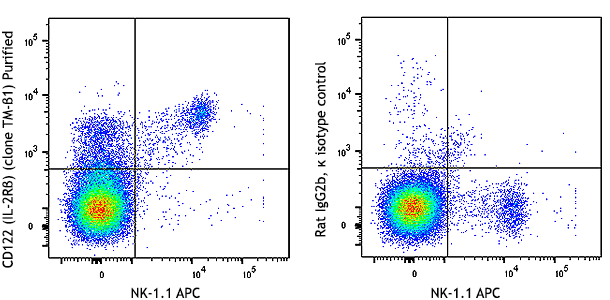



Follow Us